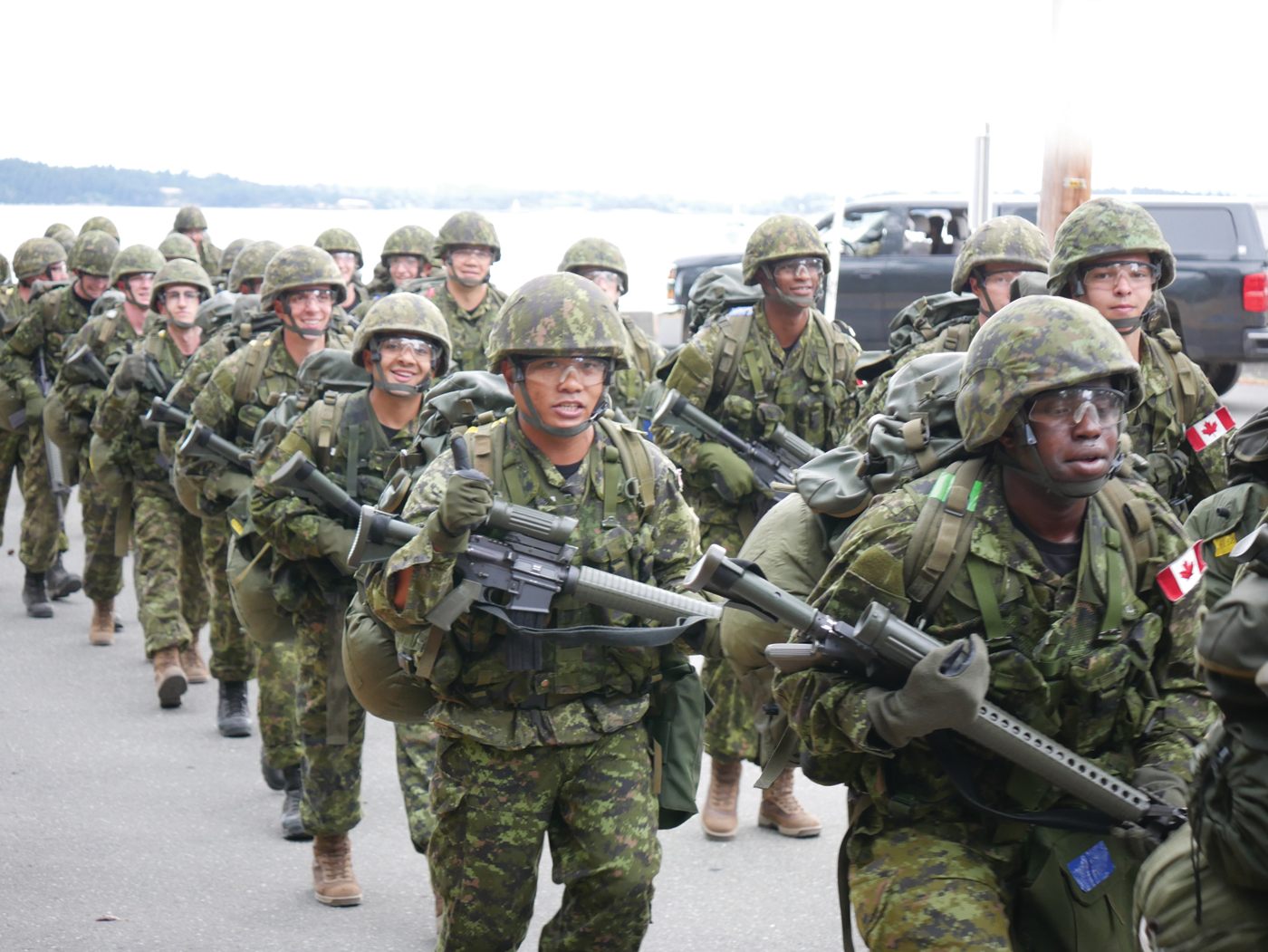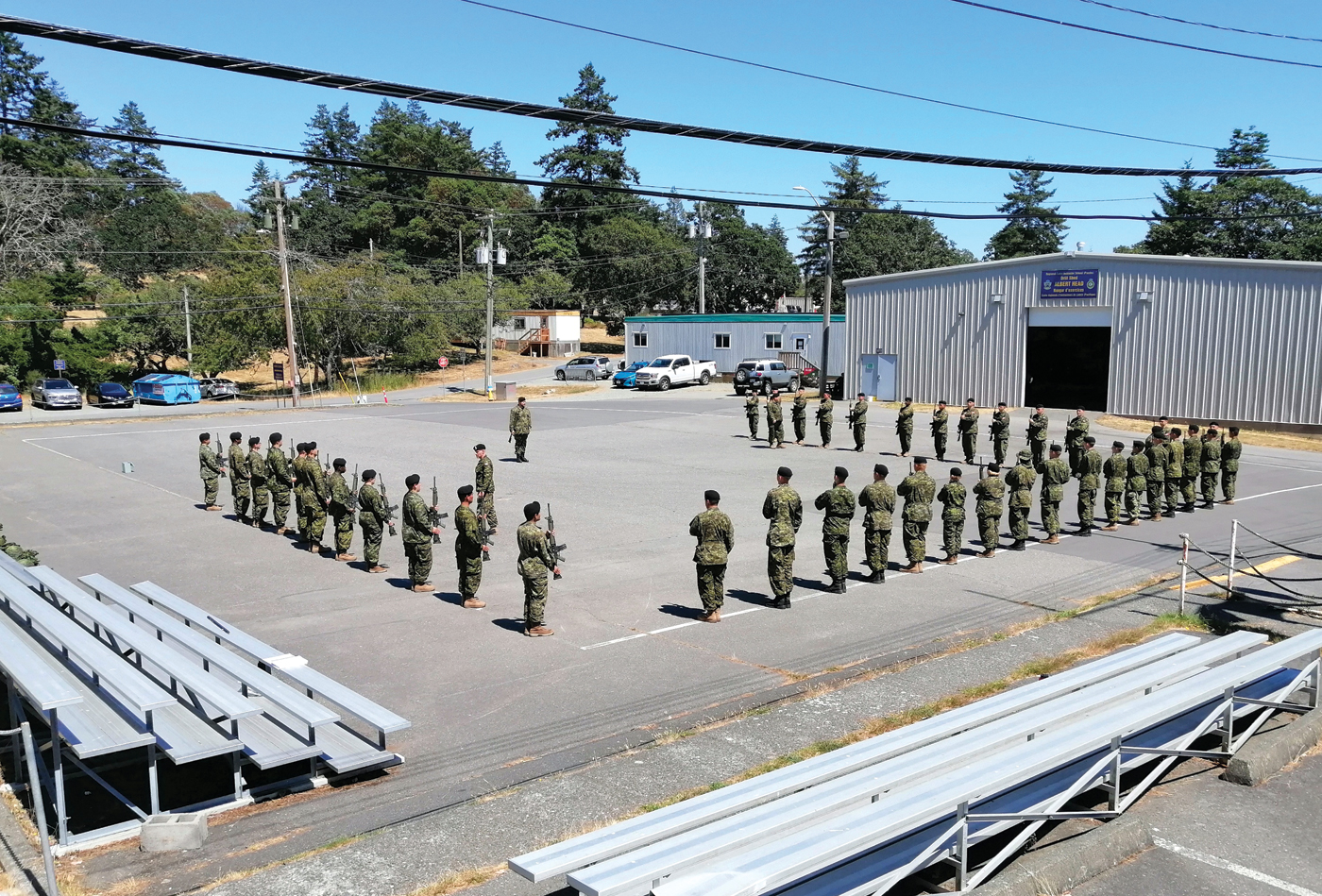Instructors needed for Decentralized BMQs
By Lookout on Oct 21, 2021 with Comments 0
Peter Mallett
Staff Writer
––
It takes a community to raise a child, and the same can be said for preparing the next wave of Regular Force sailors.
Albert Head is home for 10 weeks to newly signed naval recruits undergoing their Basic Military Qualification (BMQ) training, decentralized two years ago from the Leadership and Recruit School in Saint-Jean-sur-Richelieu, Quebec, to help ease the training burden as the school also trains army and air force personnel.
Instructors come from all corners of the navy to help Naval Fleet School Pacific deliver each training serial.
A full training serial includes the standard modules: classroom instruction, drill, field training, weapons training, range practice, first aid, basic fire extinguishing skills, confidence course completion, swim tests, and chemical, biological, radiological, and nuclear training, and physical fitness training and testing.
Over 200 recruits graduate the Basic Military Training each year on the west coast.
Navy members who volunteer for teaching duties undertake a two-week General Military Training Instructor course in preparation. However, billet shortfalls within the trades make finding instructors tough, says CPO2 Stephan Melançon, D-BMQ Chief Petty Officer.
“As this is a number one CAF priority, people who are interested need to let their chain of command be aware of their intentions as soon as possible,” he says. “The ideal candidate to be a BMQ trainer is someone who is a good mentor, that doesn’t mind working extra hours and on weekends, they also need to have really good people skills, and be able to adapt to change on the fly.”
Currently, 52 personnel are at the ready to instruct. This expertise casts a wide net: Naval Communicators, Weapons Engineering Technicians, Marine Technicians, Boatswains, Sonar Operators, Naval Combat Information Officers, Naval Communicators and even an Imagery Technician and professional musician with the Naden Band.
PO2 Katrina Bligh, an oboe player with Naden Band of the Royal Canadian Navy, decided to become a D-BMQ trainer in February, with the gig ending after the August graduation of the serial.
She completed her first serial as a Section 2IC then did her second serial in July as Section Commander.
The greatest challenge for PO2 Bligh was the administrative component – logging detailed information, evaluations, and reports on each candidate, a most time-consuming of all her tasks, she says.
“I found my training as a musician helped me a great deal in ways I did not expect. My training as a singer helped me give commands loudly and clearly, and my experience performing music in front of large groups of people meant I was not anxious when I was giving lessons or orders.”
She is one of the many volunteer instructors that have impressed CPO2 Melançon.
“Over 90 per cent of those recruited to become trainers have adjusted to the learning curve and the demands of the job very well.”
If you think you have what it takes to be a D-BMQ trainer, CPO2 Melançon suggests you reach out to your chain of command and seek permission to volunteer.
––
A typical day during Basic Military Qualification has recruits up at 5 a.m., and instrucors up even earlier, for physical training. Afterwards, recruits head to the mess for breakfast, followed by drill and instruction that emphasize basic military skills such as weapons handling, map and compass use, first aid, and CAF values training.
Since physical fitness is a key component of military service, a large part of the course is spent on fitness training. Recruits march up to eight kilometres in full combat gear, complete the confidence course, learn to rappel, and undergo the FORCE Evaluation fitness test.
A number of key stakeholders from across the formation have pitched in to make decentralized training a success. These include Personnel Support Programs, Base Administration, Base Logistics, Base Operations Range Control, Base Foods, Base Information Services, Base Accommodations, TEME, Real Property Operations, Health Services, CANEX, and Personnel Coordination Centre.
––––
Filed Under: Top Stories
About the Author:







